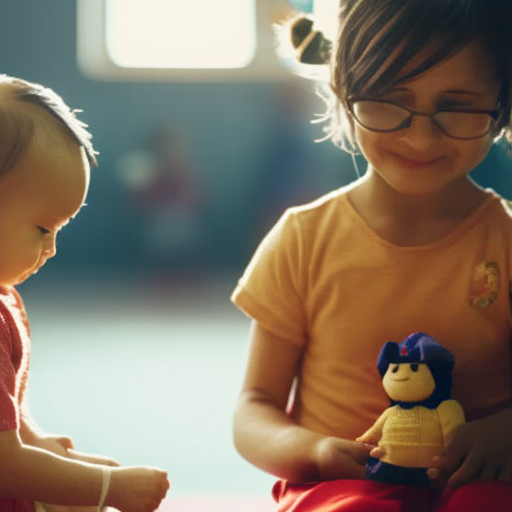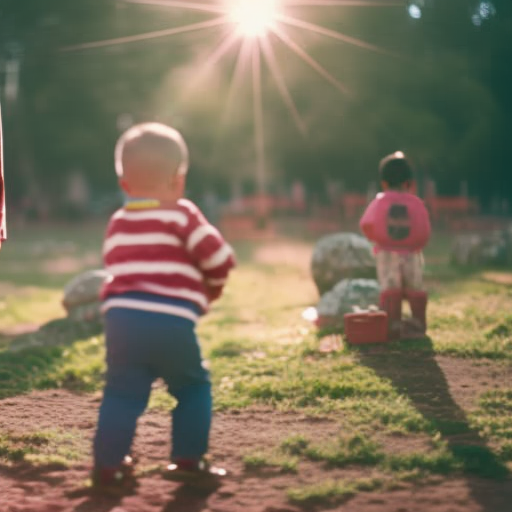"Cherishing Little Steps - A Haven for Baby and Family Journeys"
Coping With Preschool Separation Anxiety
Are you struggling with preschool separation anxiety? You’re not alone. Studies show that nearly 20% of preschoolers experience separation anxiety when starting school. But don’t worry, there are effective strategies to help both you and your child cope with this challenging transition.
By understanding separation anxiety, establishing a consistent routine, and building trust with the preschool staff, you can create a supportive environment for your little one. Gradual exposure to the preschool environment and encouraging independence will also help your child develop self-confidence.
Offering reassurance and support, connecting with other parents facing similar challenges, and managing your own emotions are essential in navigating this journey. Remember, seeking professional help is always an option if needed.
Together, we can overcome preschool separation anxiety and make this transition a positive experience for your child.
Key Takeaways
- Establishing a consistent routine can help ease the transition from home to preschool and reduce anxiety.
- Building trust with the preschool staff through open communication and involvement can make the child feel supported and safe.
- Gradual exposure to the preschool environment, starting with short visits and increasing duration over time, can help reduce feelings of overwhelm and fear.
- Encouraging independence and self-confidence by allowing the child to make choices, problem-solving, teaching self-help skills, giving responsibilities, and providing opportunities for success.
Understanding Separation Anxiety

When your child starts preschool, it’s common for them to experience separation anxiety. It’s completely normal and understandable for your little one to feel uneasy about being away from you. Separation anxiety is triggered by a fear of being separated from a loved one or familiar environment, causing distress and worry in children. Some common symptoms of separation anxiety include excessive crying, tantrums, clinging behavior, and refusal to go to preschool.
There are several causes that can contribute to separation anxiety. One possible reason is the child’s limited experience with being away from their primary caregiver. They may feel insecure and unsure about what to expect in a new environment. Another cause could be a major life change, such as moving to a new house or the birth of a sibling, which can disrupt their sense of stability and increase anxiety.
Fortunately, there are strategies that you can employ to help your child cope with separation anxiety. Firstly, establishing a consistent routine can provide a sense of predictability and security for your child. It’s also important to reassure your child that you’ll return and stick to your promises. Encouraging them to bring a comfort object, like a favorite toy or a family photo, can provide a sense of familiarity and comfort. Additionally, gradually exposing your child to longer periods of separation can help them build confidence and trust.
Establishing a Consistent Routine

To help your child cope with preschool separation anxiety, it’s important to establish a consistent routine. Having a predictable daily schedule can provide a sense of stability and security, helping your child adjust to the new environment. Here are some practical ways to establish a consistent routine:
-
Morning Rituals: Create a morning routine that includes activities your child enjoys, such as breakfast together, getting dressed, and a special goodbye ritual. This can help ease the transition from home to preschool and make the separation easier for your child.
-
Set Drop-off and Pick-up Times: Consistency in drop-off and pick-up times can help your child feel more secure. Communicate these times with your child and make sure to stick to them as much as possible. This will help establish a sense of predictability and reduce anxiety.
-
After-School Activities: Plan consistent after-school activities that your child can look forward to. This could include playdates, trips to the park, or engaging in a favorite hobby. Having something to anticipate after preschool can help your child feel more excited about the day and less anxious about the separation.
Building Trust With the Preschool Staff
You can build trust with the preschool staff by regularly engaging in open and honest communication. Building a strong parent-teacher relationship is crucial for your child’s well-being and success in preschool. When you communicate openly with the staff, it creates an environment of trust and understanding. This allows the staff to better support your child’s needs and helps you feel more confident and at ease with leaving your child in their care.
One way to foster communication with the preschool staff is by attending parent-teacher conferences. These meetings provide an opportunity to discuss your child’s progress, any concerns you may have, and to gain insight into their daily experiences at preschool. It’s important to actively listen during these meetings and ask questions to ensure a clear understanding of your child’s development.
Additionally, take advantage of any communication channels the preschool offers, such as newsletters, emails, or an online platform. These can provide valuable information about upcoming events, curriculum updates, and ways to support your child’s learning at home.
Another effective way to build trust with the preschool staff is by volunteering in the classroom. This allows you to witness firsthand how the staff interacts with the children and gain a deeper understanding of the preschool’s daily routines and activities. It also shows the staff your commitment to your child’s education and involvement in their preschool experience.
Trust is built through consistent communication and active involvement in your child’s preschool journey. By establishing a strong parent-teacher relationship, you can ensure that your child feels supported, safe, and happy in their preschool environment.
Gradual Exposure to the Preschool Environment
One effective way to ease preschool separation anxiety is by gradually exposing your child to the preschool environment. This approach allows your child to become familiar with the new surroundings, routines, and people at their own pace, reducing feelings of overwhelm and fear. As a parent, your involvement in this process is crucial in providing the necessary support and reassurance as your child adjusts.
Here are some key strategies to facilitate a gradual adjustment to the preschool environment:
-
Visit the preschool before the start date: Take your child to visit the school a few times before their first day. This will help them become familiar with the classrooms, play areas, and meet the teachers.
-
Short initial visits: Begin with short visits to the preschool, gradually increasing the duration over time. This will allow your child to gradually acclimate to the new environment without feeling overwhelmed.
-
Stay connected with the teachers: Maintain regular communication with the preschool teachers to stay informed about your child’s progress. This will help you understand how your child is adapting and allow you to provide any necessary support.
Encouraging Independence and Self-Confidence

Gradually exposing your child to the preschool environment can also help foster their independence and self-confidence. Encouraging independence is important as it allows your child to develop a sense of autonomy and self-reliance. Here are some practical ways to promote independence and self-confidence in your child:
| Encouraging Independence | Fostering Self Esteem |
|---|---|
| Allow your child to make choices | Praise their efforts and achievements |
| Encourage them to problem solve | Provide opportunities for success |
| Teach them self-help skills | Model positive self-talk and confidence |
| Give them responsibilities | Celebrate their uniqueness |
Creating a Goodbye Ritual
To establish a smooth transition and alleviate preschool separation anxiety, create a goodbye ritual that provides comfort and reassurance for your child. Goodbye rituals can help your child feel more secure and confident as they navigate the challenges of saying goodbye and starting their day at preschool.
Here are some ideas for creating a meaningful and effective goodbye ritual:
-
Consistency: Establish a consistent routine for saying goodbye. This helps your child know what to expect and provides a sense of stability. Whether it’s a special phrase, a hug, or a wave, make sure to do it the same way every time.
-
Personalized ritual: Create a ritual that’s unique to your child’s preferences and interests. This could involve a special handshake, a secret code word, or a small token that they can keep with them throughout the day.
-
Emotional validation: Acknowledge your child’s feelings and reassure them that it’s okay to feel sad or anxious about saying goodbye. Let them know that you understand and empathize with their emotions.
Dealing with tears can be challenging, but remember that it’s a normal part of the separation process. Stay calm and composed, and offer comfort and support. Remind your child that you’ll be back to pick them up and that you love them.
With time and patience, your goodbye ritual will become a comforting routine that eases their anxiety and strengthens your bond.
Communicating Effectively With Your Child
Establish open and honest communication with your child to address their preschool separation anxiety effectively. Building a strong rapport with your child is crucial in helping them navigate through this challenging time. Effective communication is key to understanding their fears and concerns, and it allows you to provide the support and reassurance they need.
Start by creating a safe and nurturing environment where your child feels comfortable expressing their emotions. Encourage them to share their feelings and thoughts openly, without judgment. Listen attentively to what they’ve to say, and validate their emotions. Let them know that it’s okay to feel anxious or sad about being separated from you.
As you communicate with your child, use simple and age-appropriate language. Avoid using complex terms or concepts that may confuse them further. Instead, try to explain things in a way that they can understand, using examples or visuals to illustrate your point.
Additionally, be mindful of your body language and tone of voice when communicating with your child. Maintain a calm and reassuring demeanor, as this will help them feel secure and understood. Show empathy and understanding, acknowledging their concerns and being patient with their emotions.
Offering Reassurance and Support
To offer reassurance and support during preschool separation anxiety, create a consistent routine that provides comfort and stability for your child. Young children thrive on predictability, so having a regular schedule can help alleviate their anxiety.
Here are some ways you can offer empathy and provide comfort to your little one:
-
Validate their feelings: Let your child know that it’s okay to feel sad or scared when saying goodbye. Acknowledge their emotions and assure them that you understand how they feel.
-
Offer a transitional object: Provide your child with a special item, such as a stuffed animal or a family photo, that they can keep with them during the day. This can provide a sense of security and remind them of you.
-
Stay calm and reassuring: Even if you’re feeling anxious or guilty about leaving, try to remain calm and confident when saying goodbye. Reassure your child that you’ll be back and that they’ll have a great time at preschool.
Connecting With Other Parents Facing Similar Challenges

If you frequently find yourself facing preschool separation anxiety, connecting with other parents who are going through similar challenges can be a valuable source of support and understanding. Sharing experiences with other parents can help alleviate feelings of isolation and provide practical tips on coping strategies. It’s comforting to know that you’re not alone in this journey and that others have faced similar challenges with their children.
One effective way to connect with other parents is by joining parent support groups or online communities. These platforms provide a safe space to share your concerns, ask questions, and receive advice from parents who have been through it all. You can also attend workshops or seminars specifically designed for parents dealing with separation anxiety. These events often feature experts who can offer guidance and answer any questions you may have.
To help you get started on your journey of connecting with other parents, here’s a table that highlights some ways you can find and engage with fellow parents facing similar challenges:
| Method | Description |
|---|---|
| Parent Support Groups | Join local or online groups where you can connect with parents facing similar challenges. Share your experiences, ask questions, and provide support to others. |
| Workshops and Seminars | Attend events specifically designed for parents dealing with separation anxiety. Gain insights from experts and connect with other parents in a supportive environment. |
| Online Communities | Join online forums, social media groups, or chat rooms dedicated to preschool separation anxiety. These platforms allow you to connect with parents from different locations and backgrounds. |
| Playdates and Meetups | Arrange playdates or meetups with parents of children experiencing separation anxiety. It provides an opportunity to share experiences, exchange tips, and offer support to one another. |
Managing Your Own Emotions
One way to manage your own emotions when dealing with preschool separation anxiety is by acknowledging and addressing your own feelings. It’s completely normal to feel anxious and worried about leaving your child at preschool. Remember, you aren’t alone in this experience. Many parents go through the same emotions and concerns when their child starts preschool.
Here are some strategies to help you manage your own anxiety and practice self-care during this time:
- Validate your emotions: Recognize that it’s okay to feel anxious or sad about leaving your child. Acknowledge your feelings and give yourself permission to experience them.
- Seek support: Talk to other parents who’ve gone through similar experiences. Share your thoughts and concerns with them. Sometimes just knowing that others understand what you’re going through can provide comfort and reassurance.
- Take care of yourself: Remember that self-care is important. Prioritize activities that help you relax and recharge. Whether it’s exercising, reading a book, or enjoying a cup of tea, make time for yourself and engage in activities that bring you joy and peace.
Managing parental anxiety and practicing self-care during separation can help you better cope with preschool separation anxiety. By addressing your own emotions and taking care of yourself, you’ll be better equipped to support your child through this transition. Remember, you’re doing the best you can, and your child will benefit from your love and support.
Seeking Professional Help if Needed
Consider consulting a mental health professional if you’re finding it difficult to manage your own anxiety and cope with your child’s preschool separation. Seeking professional guidance can provide you with the support and tools you need to navigate this challenging time. A mental health professional can offer valuable insight and help you develop coping strategies to manage your anxiety. They can also provide therapy options that can benefit both you and your child.
When choosing a mental health professional, it’s important to find someone who specializes in working with young children and families. Look for therapists who’ve experience in treating separation anxiety or early childhood issues. They can offer tailored techniques and interventions to address your child’s specific needs.
Therapy options for preschool separation anxiety may include cognitive-behavioral therapy (CBT), play therapy, or parent-child interaction therapy. These approaches can help your child understand and manage their emotions, build resilience, and develop healthy coping mechanisms. Additionally, therapy sessions can provide a safe space for you to express your concerns and receive guidance on how to support your child during this transition.
Frequently Asked Questions
How Long Does It Usually Take for a Child to Adjust to Preschool and Overcome Separation Anxiety?
It usually takes some time for a child to adjust to preschool and overcome separation anxiety. But with strategies for parents and professional support, you can help your little one through this challenging transition.
What Are Some Signs That My Child May Be Experiencing Separation Anxiety at Preschool?
You may notice signs like clinging, crying, or refusal to go to preschool. It’s important to recognize these signs and address your concerns. Remember, you’re not alone in this journey.
How Can I Help My Child Feel More Comfortable and Secure When Dropping Them off at Preschool?
To help your child feel comfortable and secure at preschool, try these strategies: establish a routine, provide reassurance and love, gradually increase separation time, communicate with the teacher, and stay positive. You’re not alone in facing these challenges!
Are There Any Specific Strategies or Techniques That Can Help Ease My Child’s Separation Anxiety?
There are specific strategies and techniques you can use to ease your child’s separation anxiety. By implementing these methods, you can help them feel more comfortable and secure when you drop them off at preschool.
What Should I Do if My Child’s Separation Anxiety at Preschool Seems to Be Getting Worse Instead of Improving?
If your child’s separation anxiety at preschool is worsening, it’s important to implement strategies for dealing with severe separation anxiety. Consider seeking professional help to address the issue effectively.
Conclusion
As you navigate the challenging journey of preschool separation anxiety, remember that you’re the captain of your child’s ship.
With understanding, routine, trust, and gradual exposure, you can steer them towards independence and self-confidence.
Offer reassurance, connect with other parents sailing the same seas, and manage your own emotions along the way.
If the waves become too overwhelming, don’t hesitate to seek professional help.
Together, you can weather this storm and guide your little one to calmer waters.



Thank you for your sharing. I am worried that I lack creative ideas. It is your article that makes me full of hope. Thank you. But, I have a question, can you help me?
Thank you for your sharing. I am worried that I lack creative ideas. It is your article that makes me full of hope. Thank you. But, I have a question, can you help me?